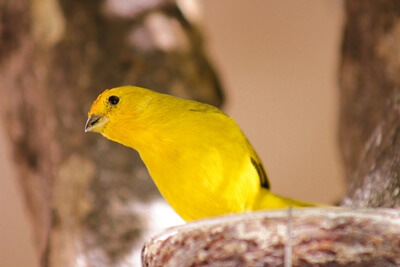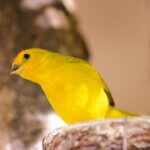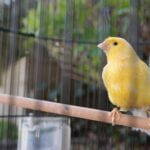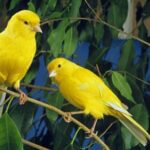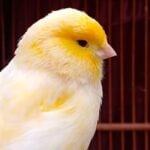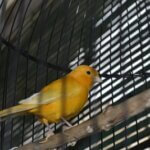A fully-fledged canary that’s well-fed and properly taken care of should weigh 22-25 grams.
So, if you notice that your canary weighs less or appears skinny or emaciated, despite offering it lots of food, there’s likely to be an underlying problem.
Since canaries don’t weigh much, any weight changes, no matter how small, can have serious implications for their health and well-being.
Why Is My Canary Not Eating?
A lack of appetite in canaries affects their ability to eat normally, resulting in sudden weight loss.
Canaries are sensitive birds whose appetites can be adversely affected. So, if your canary is eating less than normal, pay close attention to its other physical and behavioral symptoms.
Here are common reasons why canaries lose weight:
Nutritional Deficiencies
Canaries need a well-balanced diet to grow healthy and strong. Their food staples include:
- White millet
- Hulled oats
- Flaxseed
However, these foods don’t contain all the nutrients that a canary needs for optimal health.
Consequently, a canary fed an exclusive seed diet will eventually experience appetite loss due to a lack of variety in its diet and a craving for other nutrients that its current diet doesn’t provide.
For this reason, it’s important to supplement your canary’s regular diet with other vitamin-rich foods, such as fresh fruits, vegetables, eggs, and beans.
Proteins are particularly important since they promote the healthy growth and repair of muscles, tissues, and feathers. So, if a canary doesn’t ingest enough protein, you’re likely to notice a drop in weight.
Also, a canary should receive enough minerals in its diet to support various physical and metabolic activities. For example, calcium is essential for the growth and development of:
- Beaks
- Bones
- Connective tissues
- Feathers
A calcium deficiency may be caused by inadequate calcium intake or lack of vitamin D, which helps absorb the mineral. Examples of foods rich in calcium include:
- Eggs
- Leafy green vegetables
- Cuttlebone
- Crushed oyster shells
Intestinal Blockage
Sometimes, canaries don’t receive enough minerals (like sodium, potassium, magnesium, and iron) in their regular diet.
So, they often eat dirt, soil, gravel, and rocks to compensate for these deficiencies. Unfortunately, this can cause their crop and gastrointestinal tract to become blocked.
Impaction is a serious problem since it prevents food movement through the digestive tract. Not only does this cause discomfort, but it can lower their appetite and lead to severe weight loss.
Besides appetite loss, other symptoms of impaction include:
- Vomiting
- Frequent regurgitation
- Hard and extended crop
- Lethargy
- Reduced amount of droppings
- Respiratory distress
- Depression
- Head bobbing
Stress
Canaries are susceptible to stress, which can cause them to eat less than they normally would.
Although stress in canaries is often associated with poor nutrition and illnesses, numerous other factors can contribute to stress.
Since canaries are creatures of habit, any changes to their daily routines can cause them to become uneasy. Likewise, changes to a canary’s environment, such as moving to a new home or shifting the location of its cage, can also induce stress.
Other common stressors for canaries include:
- Noise
- Boredom
- Changes in the light cycle
- Overcrowded cage
- Presence of wild animals
Canaries can exhibit stress in other ways aside from refusing to eat.
So, if you suspect your pet is stressed out, you need to pay close attention to any other physical and behavioral symptoms it’s manifesting. Look out for:
- Increased aggression
- Changes in vocalizations, such as loud shrieking and screaming
- The appearance of “stress lines” on feathers
- Timidness and self-isolation
- Self-destructive behaviors, such as feather plucking and self-mutilation
Constipation
Canaries can suffer from constipation, although it’s rare.
Constipation is likely to happen if your canary doesn’t receive enough fiber, water, or oil in its diet. As a result, your canary may face difficulties when pooping and may produce drier-than-usual droppings.
If your canary is constipated, it’ll likely manifest other signs, such as:
- Refusing food
- Aggressive behavior
- Irritability
- Inactivity
- Feather plucking
- Depression
If your canary is constipated, you can remedy this problem by giving it a few drops of vegetable oil using a dropper. This will help lubricate its digestive tract to facilitate the smooth movement of waste.
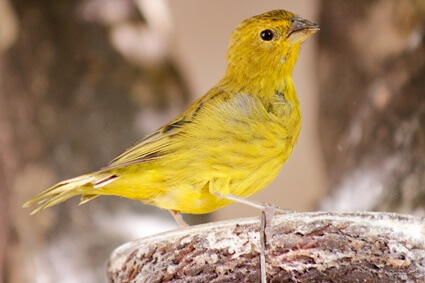
Egg-Binding
Egg-binding occurs when an egg gets stuck inside a female canary’s body and can’t come out within a normal time frame.
This causes the bird to strain to expel the egg from its body. While this condition is fairly common in many species of birds, including canaries, it can cause death if it is not resolved promptly.
According to the Journal of Avian Medical Surgery, egg-binding is caused by the following factors:
- Dietary deficiency, such as low calcium and vitamins D and E.
- Pathologies of the reproductive tract, such as a small oviduct.
- Infections and diseases
Female birds that are egg-bound usually experience severe symptoms:
- Constipation
- Inability to walk
- Loss of appetite
- Strained breathing
- Lethargy
- Depression
- Abdominal swelling
If not treated promptly, egg-binding can result in severe health complications, such as:
- Oviduct or cloaca
- Kidney damage
- Death
For this reason, egg-binding should be treated as an emergency.
Gastrointestinal Parasites
Gastrointestinal parasites are among the leading causes of poor appetite and weight loss in canaries because they lodge themselves in the digestive tract and consume the ingested food in the intestines.
This deprives canaries of the nutrients they need to stay healthy. Intestinal parasites can also make the canary feel full after consuming a small amount of food, so your canary may skip meals.
According to Avian Medicine, intestinal parasites not only affect the digestive tract of birds but can also spread to other body organs, including the following:
- Kidneys
- Uterus
- Liver
- Respiratory tract
The most common types of intestinal parasites found in canaries include:
- Ascarids (Roundworms)
- Tapeworms
- Threadworms
Captive canaries usually contract intestinal worms from ingesting the eggs or larvae of these parasites found in the feces of infected birds.
Since most infected birds don’t manifest any physical signs, a diagnosis of intestinal parasites is usually made by examining the canary’s feces.
Once a vet has diagnosed the problem, they’ll prescribe anti-helminthic drugs to kill the worms. The most commonly used drugs for worm control in canaries are Praziquantel and Epsiprantel.
Why Has My Canary Stopped Eating?
Canaries’ refusal to eat usually indicates an appetite problem. However, numerous factors may cause appetite loss in canaries, including:
- Dietary deficiencies
- Crop impaction
- Constipation
- Mental stress due to illness or environmental factors
- Egg-binding
- Bacterial infections, such as candidiasis
- Intestinal parasites
How Long Can Canaries Go Without Food?
The average canary can survive for 1-3 days without food.
Healthy canaries with at least 10% fat in their overall body weight can go up to 3 days without eating. Meanwhile, canaries with low body fat will only live for around 1 day without food.

